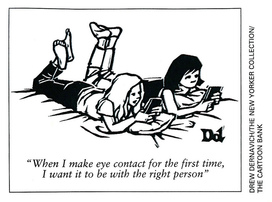 I began reading the article Ashley Madison Turns Loneliness into a Cash Cow and I had good expectations when I read the first few lines... but then the author and her wild assumptions completely lost me. She seems to have an outdated understanding of love, desire, and relationships. I agree with her sadness about people seeking out connection secretly and outside of their relationship. Unfortunately, she does a poor job at supporting her ideas and then runs amok with outdated assumptions. Yes, love is not a mystery. Yes, therapists and counselors can help couples ignite their passion and desire toward each other. But no, love of others is not our greatest resource. Your greatest resource is love for yourself. We do not HAVE to have love of others in order to be successful at our life goals. It is nice to have love, it is important to be connected, but we can survive by loving our self and caring for our own needs. In fact, according to Maslow’s Hierarchy of Needs, sex is at the bottom, the most important, and love is further up in the hierarchy. The author continues on with stating that ALL evidence shows that humans are hard-wired to mate with one partner. Humans are socially wired to mate with one partner, not biologically wired. All over the world there are couples that seek out connection, sex, and intimacy with more than one partner. Dossie and Janet, the authors of the book Ethical Slut, do a wonderful job writing about being in relationships with more than one partner. The book Sex at Dawn by Ryan and Jethá, highlights historical and current communities that do not subscribe to the social norm of being with only one mate. This is not about advocating for open relationships, polyamory, or alternative life-styles. It is about clearly highlighting that we are not biologically hard wired; we are socially hard wired. Jack Morin, in his book The Erotic Mind, speaks about the need for space in order to create erotic desire. “After all, passion is all about erotic play and we play best when we feel safe and connected to others (Ashley Madison Turns Loneliness into a Cash Cow).” Jack Morin and Esther Perel, author of Mating in Captivity would take issue with the above statement. Passion is ignited when there is emotional or physical space between the partners, and passion dies when partners over identify or are enmeshed. Morin labeled this experience, “the desire of longing and anticipation.” Perhaps for some, the best erotic play happens when they feel loved and connected. But, what about the couples who have passionate makeup sex after a fight? Where would they fit in? Again, I take issue with the statements Dr. Sue Johnson so blatantly throws out there and the very clear research bias that she has. The flaw she makes is that sex and connection must always be one. As she clearly says “...research studies say that if we emotionally shut down and separate sex from our emotional life, we end up actually enjoying sex less!” Many sexually active people would disagree with this. Often, people will be concerned about their “emotionless” sex because of their irrational belief that everyone’s sexual experience MUST be the same and the ONLY way to enjoy “true” sex is if you are in-love. And for that, I would suggest the book Sex without Guilt in the 21st Century by Albert Ellis. ___________________________________________________________________ Sara Schapiro-Halberstam, MHC-LP, CASAC is a psychotherapist in New York City where she practices individual therapy, couples counseling, and sex counseling. You can contact Sara at [email protected]
0 Comments
 When starting college many students take a couple of random classes on different topics until they find their passion and career interests. Casual dating is a similar experience. Casual dating gives you the chance to explore what interests you and what does not interest you in a future partner. Hopefully, by the time you consider to settle with a life partner you have a good picture of what you want and do not want; what you are willing to compromise on and what you are not willing to compromise on. Casual dating is not the same as a booty call. While booty calls are all about sex, casual dating requires you to put in the effort into the dating steps. Yep, you guessed it, which is why it is called casual dating. Casual dating is also not the same as open-relationships or polyamorous relationships. These relationships require a level of commitment and relationship goals something that casual dating does not require. Communication, communication, communication The corner stone of successful casual dating is honesty and communication; actually, all successful relationships require good communication. But, casual dating requires you to be on your A-game with communication. Let your potential casual date/buddy know that you are not looking to be their soul mate or lifetime partner. Setting up this very clear boundary will save you from awkward moments in the future. Additionally, let them know that you are and will be dating other people and he or she is free to do the same. No extra benefits Since you are keeping this casual and do not want to blur the lines of a committed relationship and a casual relationship, do not do any “boyfriendy” and or “girlfriendy” things. Never expect your casual date to give you special treatment or go out of their way for you, such as picking you up in the rain. Now, no need to be heartless here but keep your radar up and do not slip into boyfriend and girlfriend patterns. If you find yourself watching movies you hate with your casual date because he or she likes the movie, it is time to get out. Those compromises happen in committed relationships. Date other people Now that you have clearly explained that you will be dating other people, go forth and conquer. Dating other people establishes the clear understanding that your dating is casual and you are not interested in more. As John White from Play it On Point says “you are keeping your options open.” If you do not date other people you will easily slip into the blurred area of “what is this relationship?” Experiment in bed Since casual dating is all about experimenting and having fun now is your time to get better in bed. Since the stakes are lower in casual relationships you can step out of your comfort zone. Experiment with a variety of sexual preferences. Ask your date what they like and how they like it. Listening to other peoples likes and dislikes can teach you a lot and is going to make you a better lover. Stay Safe Staying safe is important for all relationships but in casual dating, you know it, be on your A-game. Since both of you will be seeing other people you want to ensure that you’re safe. Speak with your date about condoms, birth control, and getting tested. Let them know that you have been tested and you would like to know when they have been tested. Get out Casual dating is about experimenting and having fun. If you feel that you have had all the fun and learned from your experience it is time to get out. If you were honest up until now severing ties with your casual date should not be very challenging. Let them know that this relationship has run its course and you are ready to move on. See a therapist If you find it impossible to keep your casual relationships casual, perhaps seeing a therapist can help. A sex positive therapist can help you find your hiccups and explore with you where you slip-ups are and why keeping you boundaries clear is a challenge for you. ______________________________________________________________________________________ Sara Schapiro-Halberstam, MHC-LP, CASAC is a psychotherapist in New York City where she practices individual therapy, couples counseling, and sex counseling. You can contact Sara at [email protected]  Originally published by the JewishNews.com http://jewishnews.com/2016/03/08/the-art-of-masking Hearing the word masks immediately awakens images of costumes, masks, and makeup. While there at times when we celebrate dressing up there are times when we should reflect on the masks we wear daily. Carl Jung, the founding father of the persona psychology theory, named social desirable behaviors, personas or masks. Masks are the cover for our true self or to manage our innate impulsive behaviors. Our mask consists of the clothing we wear, the language we speak, the topics we discuss, the tone of our voice, and the makeup we wear. We have many masks and we become quite adept at calling on different masks for different situations. You might wear a serious mask while at work and a fun mask with friends. Think about how your clothing changes per situation, how you filter the topics you discuss, how the tone of your voice changes. Masks are also used when we need to restrict an impulsive reaction. For example, you might want to show your temperamental-self when someone crosses you, in its stead you pull out your socially appropriate mask and speak calmly. Masks are important because they ensure we are acting appropriately and according to the environment we are in. Our first masks are created at early stages of life. Those masks are designed from our parental messages, and as we begin to interact socially we design even more masks. When we hear the message “good girls sit nice” we create a “good girls” mask. When we hear the message “big boys don’t cry” we create a “big boy” mask. Not surprising, we take our masks with us into adulthood. Our masks become more detailed as we grow older and hear more messages of what “nice” looks like, “friendly” looks like, “smart” looks like, or “successful” looks like. While masks are important they can also hinder us. There are times when we are so busy masking that we forget who our true self is. Masks can interfere with our relationships because they create barriers between two people. In order to connect to others we need to be able to show our authentic self. At the same time, masks protect us from rejection. One of our motivations to wear masks is because of an implicit fear that if we remove our mask we will be rejected. Even more so, if we are rejected while wearing a mask, then we were not rejected, our mask was rejected. Hence, masks can often feel like the safer option. Masks are essential for a productive functioning society. There is no need to crusade for mask removal, but it is important to know our masks. Know which masks you wear and why you are wearing it. Are you wearing the timid mask because it is socially appropriate or are you wearing it because you are too afraid that your confident-self will be rejected? Keep tabs on situations where you are only wearing masks and your authentic self never shows. There are some environments where you may find yourself feeling overwhelmed because you are spending so much energy masking your true self. What are the benefits of these masks and are the masks helping you in anyway? Wearing a friendly mask when out with others while your true self is feeling bored is probably a good idea. But, wearing a super-mom mask while feeling drained stops you from being able to share your true experiences with others. Thereby, causing you to lose out on emotional support you would benefit from. Ask yourself how you feel while wearing a specific mask. Some masks feel good, some do not, which are you wearing? You might enjoy wearing the mask of an intellectual with you colleagues but would prefer to enjoy your superficial-self while with friends but you find that there is no space for your true self. Feeling forced into a mask is constraining and will only hamper your personal growth. So, tick… tock… it is time to remove our masks. _________________________________________________________________________________________ Sara Schapiro-Halberstam, M.S., CASAC is a psychotherapist in New York City where she practices individual therapy, couples counseling, and sex counseling. You can contact Sara at [email protected] |
Authors
Archives
February 2023
Categories
All
|
 RSS Feed
RSS Feed